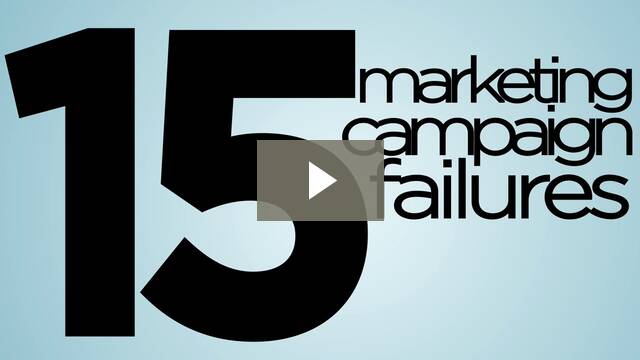15 Marketing Campaign Failures
Top Marketing Campaign Failures
Everyday, we’re bombarded by advertising. No matter which way you look, corporate messages implore you to purchase their way of thinking. By and large just the sheer amount of exposure works its magic upon consumers everywhere, urging them to buy more than ever before. However, occasionally an advertising campaign or marketing strategy is so poorly conceived that all its makers receive is backlash. Whether it be having advertising banned, arresting those involved or absolute rejection by the public, these flops make up an advertiser’s (and their clients’) worst nightmares. These are 15 of the biggest failures in marketing:
Holiday Inn Transsexual
The Super Bowl is an event known for causing some serious corporate salivation. It’s the chance to put out a ridiculously expensive ad, make it entertaining as hell and with any luck see a rise in profits. But in thinking of new, edgy, hilarious concepts sometimes misses the mark.
This has never been clearer than in 1998 when Holiday Inn premiered their Super Bowl commercial. In the commercial, Holiday Inn compares itself to a transsexual at a high school reunion. They catalog her various plastic surgeries as she saunters through the reunion, and eventually say that if it cost her x amount of money to get this done, and they spend exponentially more on their hotels, won’t that guarantee a wonderful stay alone?
The commercial was neither popular nor effective. LGBT groups protested and started a boycott on Holiday Inn. Average Americans now associated Holiday Inns with transsexuals. It was an all-around catastrophe, cementing its place in failed campaign history.
Calvin Klein Pedophilia
You know what’s extremely popular? Pedophilia. Among pedophiles only, though. Calvin Klein didn’t know this, and in the 1990’s he started a new ad campaign that at its heart firmly believed America would find the sexuality of minors appealing.
The ads portrayed teenagers in various states of undress, clinging and oozing off one another. They also featured a creepy director in the background, who made statements about the kids’ bodies, such as telling the teenage boys they looked like they work out. It took a little while during which people must have been saying, “man, these Calvin Klein ads are weird, but I’m not going to really think about it,” immediately followed by “those could be my kids… what is going on here?!”
The FBI had to investigate to make sure nothing illegal had happened during the making of these commercials, and Klein was forced to pull the ads and issue an apology to America. Nice try though, buddy.
50 Cent/Reebok
Once upon a time, Curtis “50 Cent” Jackson was a very popular rapper. Around the end of his super stardom, Reebok decided to shoot a commercial with him that would air only in the UK. Reebok wanted to make use of Jackson’s main claim to fame — getting shot nine times.
In the commercial, mean streets of Jackson’s youth are shown while voiceover news reporters talk about him getting shot. Then it cuts to a partially flooded diner, where 50 sits atop a floating table. Just to make sure we understand what’s going on here, he begins to count…to nine. Then he laughs in defiance before making one lasting angry face. Reebok leaves us with one final summation: I am what I am. 50 Cent is, of course, wearing Reebok sneakers throughout, no matter how little anything that goes on has to do with them.
The ad was protested by a representative of Mothers Against Guns, who had this to say about it: “(it) endorsed his type of lifestyle…by implying it was possible to survive being shot nine times.” The Advertising Standards Authority in the UK banned the ads, citing their glorification of gun violence. Reebok decided to replace 50 Cent in the campaign with Nelly, a man who is most famous for wearing Band-Aids on his face. Another well executed strategy by savvy, ironic admen.
Blockbuster: No late fees
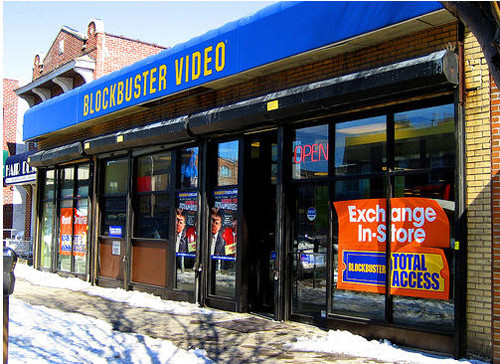
Sometimes your campaign literally kills your entire company. In 2003, Blockbuster unveiled an amazing new idea: no late fees on movies. An aggressive ad campaign followed, letting the world know that Blockbuster had rescinded their late fees and renting from them would henceforth be a permanent vacation.
But was it economically feasible to indefinitely loan out so many units, especially while promising to have new releases in at all times? The growing popularity of Netflix also didn’t help their finances. It turned out that there were, in fact, late fees. If the movies weren’t returned by a certain date, the entire cost of the movie was charged to the account. If the movie was returned later, the customer was refunded for the charge, but only in store credit and after paying a ten dollar restocking fee.
Blockbuster went from a video rental giant to a bankrupt business. This year they announced the return of late fees — no more pretending. Soon they will most likely no longer exist as a place of business. As part of the company’s Chapter 11 bankruptcy filing, Blockbuster is closing 145 stores immediately. Most of the remaining 3,000 stores are also expected to close. The Internet wins again.
McDonald’s I’d Hit It
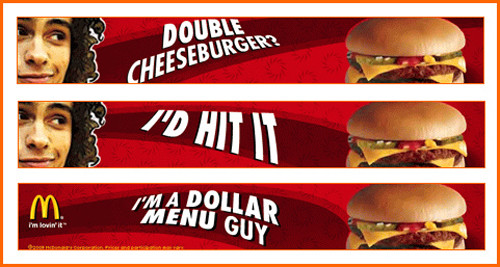
McDonald’s may no longer even need to advertise. They’re the most well-known restaurant on earth, and they have millions of loyal addicts across the globe. But they have an annual ad budget of over a billion dollars, so they figure they might as well use it.
In 2007, some ad executive must have heard his young son saying “I’d hit it,” in reference to a female specimen he found attractive. But the ad executive had burgers on the mind, and he somehow misinterpreted the young man’s lust for woman as being lust for burger. Thus, ‘I’d hit it’ was adopted into the McDonald’s lexicon.
The ad featured a young man longingly looking at a burger with words spilling out of his face that read: “Double Cheeseburger? I’d hit it. I’m a dollar menu guy.” The ad was featured as a banner on popular websites such as ESPN.com, but before long it had to be pulled. Surprise!
Nike SB Minor Threat
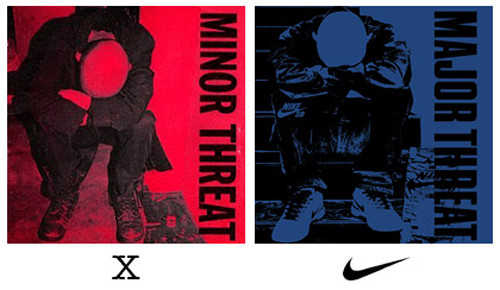
Minor Threat is one of the most popular original hardcore bands ever. They advocated sobriety, celibacy and generally rejected mainstream culture at every possible opportunity. Sounds like the best people to base a Nike campaign on!
In 2005, Nike SB used an image from the cover of Minor Threat’s self-titled album to promote their East Coast demo tour. Ian MacKaye, the former front man for the band, was none too pleased: “To set the record straight — Nike never contacted Dischord, nor Minor Threat, to obtain permission to use this imagery, nor was any permission granted. Simply put, Nike stole it and we’re not happy about it. We are not yet sure what actions, if any, we can take to stop this campaign.”
Nike tried to excuse their ad by saying that the people who created it directly were Minor Threat fans and skateboarders who were just trying to pay homage to a key influence in their lives. But they had to settle out of court with the band for an undisclosed amount, as well as pull the ads.
KFC Free Chicken
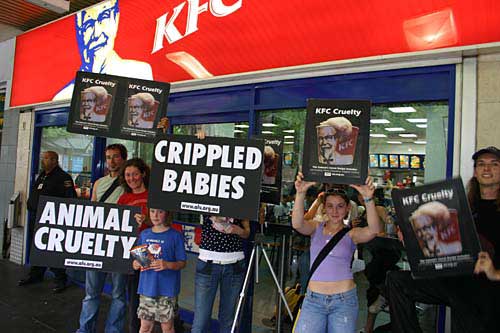
Sometimes, in the lust for promotion, companies can get a little more generous than they mean to or can physically support. It turns out that if everyone in America is entitled to a free taco, a lot of people might show up for said taco and cause pandemonium in the process.
In 2009, KFC made an unusual offer on a very popular TV show called Oprah. Viewers were told they could download a free coupon for a 2-piece chicken meal with two individual sides and a biscuit. The only problem is they weren’t at all prepared to honor the deal.
When 4 million people showed up to collect, KFC’s across America fell apart. There were mini-riots, service refusals and most importantly, not enough chicken. Even Oprah had to pull the coupon from her website! KFC was looking awfully stupid. To make up for their faux pas the President of KFC returned to Oprah to apologize for the failure and make right on the deal.
In the end, 10.5 million coupons were downloaded after all, and America consumed $42 million worth of free food. Without getting it to the people smoothly and on the first try, KFC essentially gave away a bunch of food without getting any positive press out of it. Crispy marketing FAIL.
Aqua Teen Hunger Force Bomb Scare

Silly misunderstandings can get out of hand, especially when advertisers go for an edgy look to promote their products. Best case scenario: people get the joke and buy what you want them to. Worst case scenario: they think your ads are bombs.
In 2007, two men were paid by representatives of Adult Swim, Cartoon Network and Turner Broadcasting System to put up over 30 battery-powered LED lights around hotspots in Boston depicting characters from the show Aqua Teen Hunger Force flipping the middle finger. The signs were supposed to promote the upcoming ATHF movie.
Guess what? The brilliant, ever-vigilant people of Boston thought these signs were “improvised bombs.” People all over the place started calling in reporting the ads as bombs to police, who were equally clueless as to what they actually were. The two men who put the signs up were arrested, and face felony charges of placing a hoax device to cause panic. They should more likely face charges of placing a hoax device to promote a movie. Turner Broadcasting also was forced to pay $2 million to make up for money spent responding to the imaginary bomb scare.
You’ve got to be pretty stupid to think these signs were bombs, and you also need to have never have watched ATHF, which is no easy feat. However, picking Boston for the campaign when it’s the most humorless, uninformed city was probably a recipe for disaster.
Moosejaw Prison Catalogue
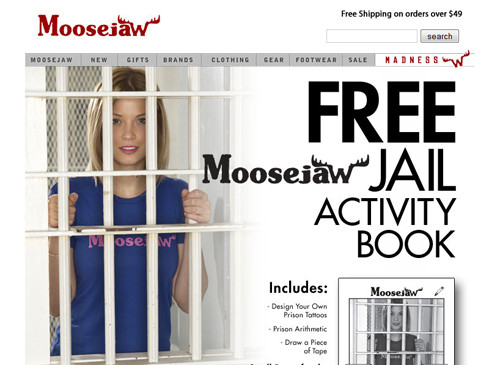
Ad campaigns can be insensitive, as well as entirely counter-intuitive. Moosejaw’s 2009 “Jail activity” catalog was both. Moosejaw, an outdoor gear and apparel company, thought it would be funny to send out its new catalog complete with a “jail activity book.” The book wonders why so few Moosejaw customers have served time, and suggests not getting shanked in the prison maze.
The main problem with this campaign is that it has absolutely nothing to do with outdoor activity whatsoever. Jail is the last place one needs a nice fleece or hiking boots. “The idea behind this particular campaign was to parody the glamorization of crime and prison by pushing it to its completely illogical conclusion,” said CEO Harvey Kanter. Anytime you call your ad campaign illogical you’re probably going to end up regretting it.
Moosejaw decided to keep the campaign, but removed certain aspects of it. They have been criticized further for the catalog’s portrayal of women acting sexually suggestive behind bars, which critics say leads to more violence against women as well as a dismissive outlook towards prison.
Honda Accord Hybrid
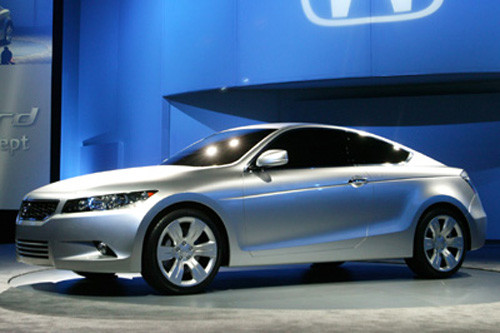
Hybrid cars are all the rage. Soon enough the world will end due to global warming and it will be our fault. One of the main reasons for this is our emissions, and more specifically those released by cars.
In the past decade almost every major car company has released hybrid models, and they’ve been selling like hotcakes. The Prius did extremely well, despite being ugly and expensive. Even Ford has moved some Escape hybrids despite their recent financial woes.
Honda’s Accord is an incredibly popular passenger car in America. It made perfect sense to release a hybrid version in the current climate. The design of the car, however, made no sense. Honda decided to release a more powerful hybrid in the Accord, but no one who drives Accords or hybrids really cares too much about horsepower. The hybrid Accord was so indistinguishable from the regular Accord that consumers were utterly unwilling to spend $9,000 more on it.
In 2007, Honda announced that they would not release the Accord in a hybrid model any longer. Their hybrid Civic had been much more successful, and they were willing to cut their losses. They had to discount all the remaining Accord hybrids, but they missed a slam dunk of a campaign. Imagine how easy it would have been to pair an incredibly popular model of car with the ever-growing hybrid market. Alas, if they had only thought outside of the idiot box.
Zune Poster Arrest
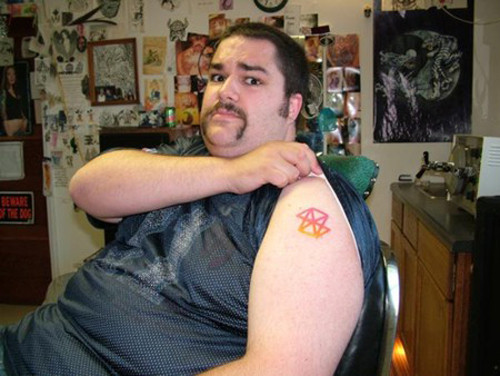
Everyone wants to be the iPod of their respective business. It’s not easy, especially for iPod’s direct competitor, Microsoft’s Zune — especially when a simple marketing campaign leads to their employees’ arrest.
In 2007, a Zune employee was attempting to put up posters advertising the Zune in Austin, Texas during the SXSW music festival. The cops decided that the thousands of tourists making a mess of the city was one thing, but this Microsoft incursion would not stand.
The arresting officer was reported as saying “We’ll have none of your advertising for your DRM’d crippleware’d crappy MP3 player littering our town.” Mess with the iPod and you get the horns.
Golden Palace Olympic Ambush
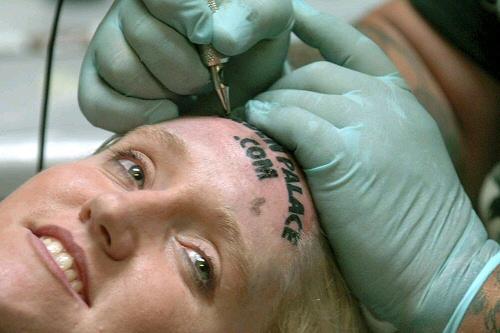
There is no larger stage than the Olympics. The world loves competition, and the stakes are always higher when it comes to world competition. Which is why Golden Palace.com (a casino website) decided to try to hijack it.
In 2004, the Summer Olympics were being held in Athens, Greece. During a synchronized swimming competition a Canadian man named Ron Bensimhon jumped out of the stands and out of his clothes, revealing a tutu and tights underneath. GoldenPalace.com was written on his front and back. Bensimhon proceeded to climb a 3 meter diving board, bow to the crowd and then belly flop into the pool.
Dubbed “the fool in the pool,” Bensimhon was quickly arrested by Greek officials. “I wanted everybody to know who I am,” explained Bensimhon. He elected to pay a 2,000 euro fine to avoid a 5 month jail sentence. Bensimhon claimed that he was releasing an album and Golden Palace was “sponsoring” it. He had done the stunt not for money, but simply to promote himself, the record and Golden Palace. It seems that while in custody the Greek officials were not very delicate with Bensimhon. “They hit me,” he said. “They took me into a bathroom and beat me up. I have suffered enough.”
What’s even stranger is that earlier in the year at a world figure skating competition in Germany, Bensimhon had done the exact same thing, interrupting the event by coming onto the ice clad in tights and a tutu adorned with GoldenPalace.com. He was detained, but soon after released.
An executive of Cyberworld Group (Golden Palace’s parent company) named Steve Baker claimed that Bensimhon had planned and executed this stunt without their knowledge or aid. However, he did have this to say about the benefits of Bensimhon’s actions: “Ambush marketing is a definitive form of marketing. It’s used quite frequently throughout the world and continues to be used,” Baker said. “It’s a time-honored way of doing marketing and certainly, it’s effective.”
World Cup Beer Ambush
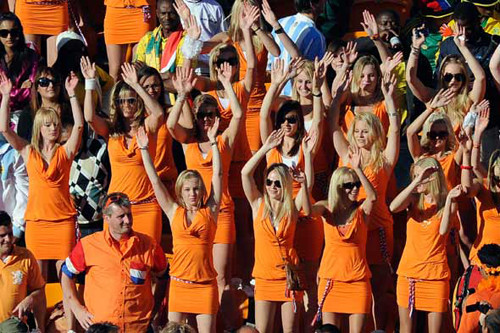
World Cup fever has gripped most continents for some time now, but the US is finally getting into the swing of things. One of the most interesting aspects of the World Cup is the way soccer is married to sex by marketers. Worldwide, ads portraying sexy women dressed up in one nation or another’s uniforms clutching some necessity spawn endlessly overnight. Instead of the traditional print, radio or television campaigns, the Dutch beer company Bavaria decided to take the concept of sexy women, their product and the World Cup and bring them all together in real life.
In the run-up to the 2010 World Cup in South Africa, Bavaria sold packs of their beer complete with a complementary orange dress in support of both the Netherlands soccer team, but also their own company. However, South Africa apparently has very strict laws against ambush marketing, and since Budweiser had paid quite a lot of money to be the official beer of the World Cup, officials weren’t going to take any competition lightly.
Two women who are suspected by South African authorities as working for Bavaria had other plans. They attended a match between the Netherlands and Denmark disguised as Danish supporters in red and white. They also had managed to convince 34 other women to join their insidious ambush. Soon after the match began the women stripped off their Danish colors to reveal the bright orange of Bavaria’s promotional dresses.
The entire group was quickly removed from the stands, and three of the women the authorities believed to be ringleaders were questioned for two hours, during which time they were put under significant pressure to reveal all those involved with the plot, as well as threatened with jail sentences. Being involved in ambush marketing is a dangerous business, but that doesn’t stop people from complaining when they get caught.
Ivanabitch Vodka’s Phallic campaign
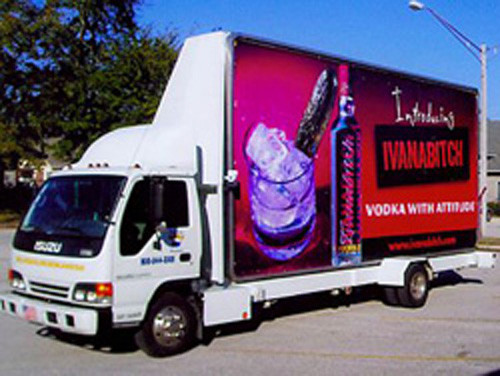
Don’t laugh. It’s a serious issue. In 2005, a Russian vodka company called Ivanabitch Vodka decided to try to move into the American market, starting a marketing campaign in Florida. They began exporting cases, setting up promotions and attempting to purchase advertising spots in the form of billboards and radio commercials. But Viacom and ClearChannel had other plans.
Central to Ivanabitch’s campaign was the idea that vodka is “(not drank) with fruit juice or candy water, they drink vodka neat, with a pickle or other marinated vegetable.” In the radio spots a female voiceover says she likes her vodka “with a pickle,” and their billboards showed large cocktail glasses filled with vodka and a pickle.
“These companies interpreted the pickle to be phallic,” said Pete Helow, managing partner of Empire Communications Group, Inc., the advertising firm for Ivanabitch in America. “We were told that they would approve the outdoor advertising if the pickle was removed, chopped up, or placed on its side. They had no problem with the name, no problem with vodka, but a big problem with the pickle…We have no intention of eliminating the pickle from our campaign.”
That takes some balls! The two biggest radio and billboard advertisers told Ivanabitch that their central campaign was too phallic for America, and Ivanabitch responds by choosing to be as phallic as they want to be. Ivanabitch is self-appointed “Vodka with Attitude,” and no matter what is going to stick to its guns, whether it’s feasible or not.
Diesel Be Stupid
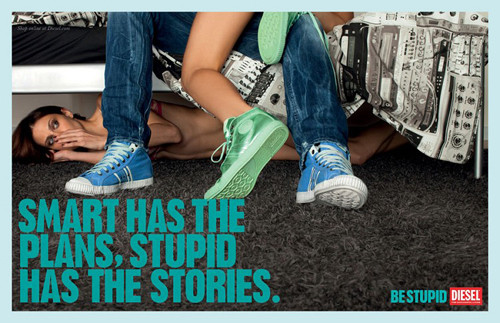
With a name like Be Stupid, it had to be a successful campaign, right? In fact it was even award-winning. However, that didn’t mean it was suitable for the U.K.
Earlier this year, a Diesel ad campaign which had won top honors from the Cannes International Advertising Festival premiered in England. The theme of the ads, being stupid, was executed mostly by young women exposing themselves in one way or another. In one ad a woman flashes a security camera while standing on a ladder. In another a woman pulls open her bikini bottom and takes a picture.
The Advertising Standards Authority ruled that the ads could cause “serious or widespread offense,” due to their placement in the public, especially around children. Diesel claims that the ads are a call to live a life that goes against accepted wisdom and being just another ordinary person. They also added the ads have no more nudity than other swimwear or lingerie ads. Perhaps Diesel is just ahead of their time, and England is not prepared yet to accept the genius that is Be Stupid.


